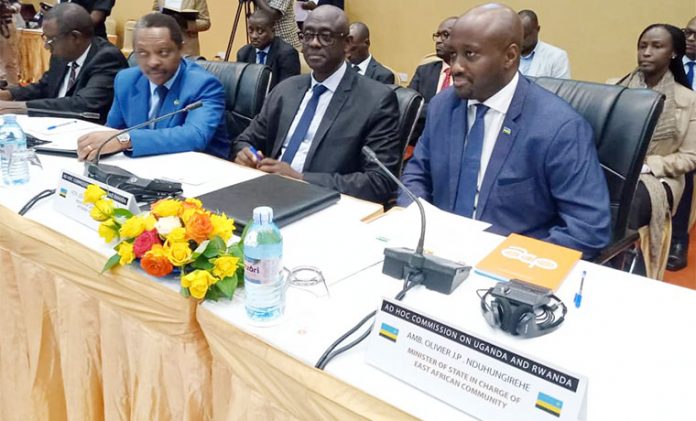After eight hours of closed-door deliberations inside a hall at the Commonwealth Resort Munyonyo, delegates from Rwanda and Uganda failed to reach an agreement and decided to refer the matters to the heads of state of both countries.
There was no communique after the representatives came out of the second meeting of Joint Ad Hoc Commission on the implementation of the Luanda MoU at 11:40 pm on Friday even when the day had started with hope that there could finally be something to write home. The talks started at around 4 pm. The first meeting of Joint Ad Hoc Commission on the implementation of the Luanda MoU was held in Kigali earlier in September.
Angola’s minister for External Affairs Manuel Augusto Domingos had said in the Kampala meeting ‘both countries showed the will to resolve the dispute peacefully”.
The Ugandan team was led by the Foreign Affairs minister Sam Kutesa and deputy attorney general Mwesigwa Rukutana. Also present on the Uganda side was state minister for Internal Affairs Obiga Kania, the Chieftaincy of Military Intelligence (CMI) boss Brig Abel Kandiho and deputy chief of defense forces Lt Gen Wilson Mbadi.
On the Rwanda side sat ambassador of Rwanda to Uganda Frank Mugambage and the minister for East African Affairs Olivier Nduhungirehe. There were also other delegates from Rwanda.
Present as witnesses were the Angolan minister for External Affairs Manuel Augusto Domingos and Democratic Republic of Congo (DRC) deputy prime minister Gilbert Kankonde.
Inside the meeting room, where journalists were not allowed, Rwanda laid on table ‘evidence’ of Uganda’s support to the armed dissidents who want to overthrow the Kigali administration. But we have been told that Uganda rejected this flatly.
Rwanda reportedly presented evidence of constant contact, including phone call records between some Ugandan officials and the people it accuses of rebelling against the Kagame government. Rwanda claimed the recent attack in Kinigi was discovered to have been coordinated by Ugandan minister of state for Regional Cooperation Philemon Mateke as evidenced by the phone records.
Rwanda also said some of the people who attempted at attacking it had fled to Kisoro in western Uganda. Also, Rwanda told Uganda that it had continued to illegally detain Rwandans even after promising to stop in the first meeting in Kigali. Uganda said there was no merit in the accusations.
Kutesa said for Uganda, the unresolved issue remains the infiltration of security agencies by Rwandan government, border closure and the illegal activities of Rwandans in Uganda. Nduhungirehe said the border closure is not the main issue because Rwanda has a duty to protect its sovereignty and safety of its citizens. Kutesa maintained that the reason why some Rwandans have been detained by Uganda is because they were suspected to be involved in espionage activities.
A few minutes to midnight, as they left the room, both Kutesa and Nduhungirehe smiled sheepishly, perhaps knowing that the dispute between Rwanda and Uganda is much deeper than had been anticipated.
They consequently referred the matter to the two principals – Presidents Yoweri Museveni and Paul Kagame – the comrades who understand its depth better than anyone else. Nduhungirehe described the talks as “deep, frank but cordial.”
For now, the status quo remains – border closed, Rwandans not allowed to travel to Uganda and it remains as uncertain as ever on when the dispute can be solved.
www.observer.ug

Putting a spotlight on business, inventions, leadership, influencers, women, technology, and lifestyle. We inspire, educate, celebrate success and reward resilience.















